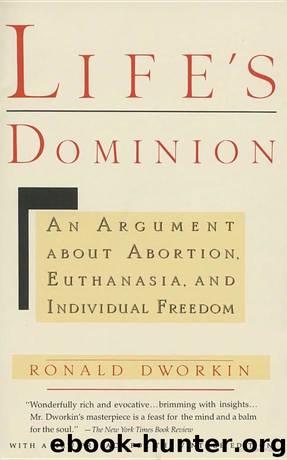Life's Dominion: An Argument About Abortion, Euthanasia, and Individual Freedom by Ronald Dworkin

Author:Ronald Dworkin [Dworkin, Ronald]
Language: eng
Format: epub
Tags: Law, Constitutional, Right to Die
ISBN: 9780307787910
Google: 7c6Zd3XP5CcC
Amazon: B004KABDPC
Publisher: Knopf Doubleday Publishing Group
Published: 2011-05-11T04:11:39+00:00
The original intention. The distinction between enumerated and unenumerated rights, which many revisionist lawyers have emphasized, is therefore wholly unhelpful to them. But their most important proposal, about how to read a detailed constitution into the abstract language of the historical document, is a different one. They say they believe in “originalism”: that the Constitution means only what the politicians who wrote it originally intended it to mean. Judges who have to decide whether the First Amendment forbids states to make flag burning a crime, or forbids them to hold prayer in public schools, for example, should ask only the historical question: did the eighteenth-century authors of the First Amendment intend it to have those consequences? (Revisionists often use the word “framers” to describe the authors of a constitutional provision, but I shall mainly avoid the word.) If the answer is no (and revisionists believe that the answer is very likely to be no for most serious problems that arise at the tag end of the twentieth century), then the Constitution does not have that force. The effect of originalism, its backers suggest, is sharply to decrease the scope of individual constitutional rights protected by the abstract clauses, and to substitute the detailed for the principled vision of the Constitution.
Conservative Supreme Court justices have found originalism particularly useful as a defense of their views. Antonin Scalia, the most radically conservative member of the present Court, frequently writes as if the intentions of the historical sponsors of some particular clause of the Constitution are the only acceptable guide to its meaning. And the newest member of the Court, Clarence Thomas, relies on original intention whenever he can, though Thomas himself, before he joined the Court, ridiculed the original-intention test as bogus and urged conservatives to accept the constitution of principle as a plain fact and to argue for conservative moral theories as the best guide to its sound application.11
The most elaborate defense of the original-intention method has been provided by Robert Bork. Reagan nominated Bork to the Court as a dedicated and intense supporter of originalism, and Bork’s nomination focused public attention on that view; but his attempts to explain and defend it in his nomination hearings were not generally regarded as convincing.12 In the book he wrote after his nomination was defeated, Bork tried to amplify and improve his defense. He described originalism as something so fundamental and self-evident that only tricksters could fail to accept and obey it. “Of course,” he said, “the judge is bound to apply the law as those who made the law wanted him to. That is the common, everyday view of what law is. I stress the point only because that commonsense view is hotly, extensively and eruditely denied by constitutional sophisticates, particularly those who teach the subject in the law schools.”13 But having begun in that confident way, Bork’s discussion of originalism was so full of qualifications, exceptions, and obscurities that originalism soon began to look hardly commonsensical or self-evident at all.
The truth
Download
This site does not store any files on its server. We only index and link to content provided by other sites. Please contact the content providers to delete copyright contents if any and email us, we'll remove relevant links or contents immediately.
| Estates & Trusts | Living Wills |
| Wills |
Lecretia's Choice by Matt Vickers(962)
American Bar Association Guide to Wills and Estates, Fourth Edition: An Interactive Guide to Preparing Your Wills, Estates, Trusts, and Taxes by American Bar Association(960)
Umbrella by Will Self(931)
How to Plan and Settle Estates by Edmund Fleming(922)
The Essential Executor's Handbook by David G. Hoffman(878)
Five Last Acts by Chris Docker(859)
To Die For by unknow(796)
Need you Now (Top Shelf Romance Book 2) by unknow(795)
The Green Burial Guidebook by Elizabeth Fournier(753)
Gresham's Law by John Guy(721)
Beyond the Grave, Revised and Updated Edition: The Right Way and the Wrong Way of Leaving Money to Your Children (and Others) by Jeffery L. Condon(685)
Life's Dominion: An Argument About Abortion, Euthanasia, and Individual Freedom by Ronald Dworkin(666)
Protecting Your Assets from Probate and Long-Term Care by Evan H. Farr(654)
Your Family Legacy: 32 ways to preserve your family's 'wealth' for generations by Palumbos Michael(652)
Estate and Trust Administration For Dummies by Margaret A. Munro & Kathryn A. Murphy Esq(648)
The Playboy of the Western World by J. M. Synge(635)
Death City by Sam West(604)
Wills, Trusts, and Estates (Aspen Casebook) by Jesse Dukeminier & Robert H. Sitkoff(587)
The Complete Guide to Planning Your Estate by By Sandy Baker(569)
